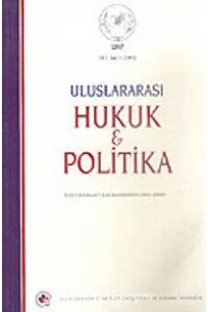Potential effects of an energy transition on Turkish-Russian relations
Enerji, uluslararası ilişkiler de dahil olmak bir dizi sosyal alanı bir çok sebeple etkilemektedir. Enerji ihracatçıları ve ithalatçıları arasındaki ilişkinin, fosil enerji kaynaklarının azalan doğası gereği er veya geç de- ğişmek zorunda kalacak olan yapısı bir araştırma alanı sunmaktadır Muhetemelen yenilenebilir enerji kaynaklarına doğru bir enerji teka- mülü gerçekleştiğinde, ülkeler arasındaki enerji ilişkilerinin doğası da, enerji ithalatçısı ülkelerin enerji güvenliği endişeleriyle şekillenen dış politikalarının değiştiği gibi, değişecektir. Öteki taraftan, muhtemel bir enerji tekamülü halklar üzerinde ciddi etkiler yaratabilir ve bu etkiler- den bazıları da milliyetçilikleri güçlendirebilir. Diğer bir deyişle, ener- jinin geleceği ve milliyetçiliklerin yükselişi arasında bir ilişki olduğu sa- vunulabilir. Bu sebeple, bu çalışmada “enerji teknolojileri” ve “yükselen milliyetçilikler” iki değişken olarak ele alınacak ve bunlardan hareketle, maddi/teknolojik arkaplandaki değişime paralel olarak bir ilişki du- rumundan bir başkasına geçişi gözlemlemek için uygun bir örnek olan Türk-Rus ilişkilerinin geleceğine ilişkin dört senaryo üretilecektir
Enerji dönüşümünün Türkiye-Rusya ilişkilerine potansiyel etkileri
Energy is intrinsic to the social sciences, including international rela- tions, for to a variety of reasons. The course of relations between energy exporters and importers presents a field of research which is bound to change sooner or later due to falling fossil fuel reserves. When an energy transition (probably toward renewable sources) happens, just as the na- ture of energy relations between countries changes, the foreign policies of energy importers will change as well, driven as they often are by energy security concerns. Such an energy transition could have severe effects on nations and some of these effects may strengthen nationalisms. In other words, there may be a correlation between the future of energy and the rise of nationalisms. In this paper Turkish-Russian relations will be taken as a backdrop to explore the potential repercussions of such a ma- terial/technological transition. Energy technologies and risisng nation- alisms will be taken as two factors to produce four distinct scenarios for the future of said relations.
___
- Alcenat, Westenley and Binnur Özkececi-Taner, “Potential Roles for Turkey As a Ris- ing Regional Actor in Eurasia”, Insight Turkey, Vol. 12, No. 3, 2010.
- Allen, Robert, C., “Backward into the Future: The Shift to Coal and Implications for the Next Energy Transition”, Energy Policy, Vol. 50, 2012.
- Babali, Tuncay, “Regional Energy Equations and Turkish Foreign Policy: The Middle East and the CIS”, Insight Turkey, Vol. 12, No. 3, 2010.
- Balcer, Adam, 2012. “Between Energy and Soft pan-Turkism: Turkey and the Turkic Republics”, Turkish Policy Quarterly, Vol. 11, No. 2, 2012.
- Bazoğlu Sezer, Duygu, “Turkish-Russian Relations: The Challenges of Reconciling Geopolitical Competition with Economic Partnership”, Turkish Studies Vol. 1, No. 1, 2000.
- Bilgin, Mert, “Energy Policy in Turkey: Security, Markets, Supplies and Pipelines”, Turkish Studies Vol. 12, No. 3, 2011.
- Davutoğlu, Ahmet, “Turkey’s Foreign Policy Vision: An Assessment of 2007”, Insight Turkey, Vol. 10, No. 1, 2008.
- Dupont Alan and Thirlwell, Mark, “A New Era of Food Insecurity?”, Survival, Vol. 51, No. 3, 2009.
- EMRA Energy Market Regulatory Authority, “Elektrik Piyasası Sektör Raporu 2011”, 2011.
- Energy Information Administration, “World Oil Transit Chokepoints”, http://www.eia. gov/countries/regions-topics.cfm?fips=WOTC, 2012.
- Grunwald, Armin, “Energy Futures: Diversity and the Need for Assessment”, Futures, Vol. 43, 2011.
- Heywood, Andrew, Politics, (New York: Palgrave Foundations, 2002).
- Hughes, Nick, Stratchan, Neil, and Gross, Robert, “The Structure of Uncertainty In Future Low Carbon Pathways”, Energy Policy, Vol. 52, 2013.
- Inayatullah, Sohail, “Reductionism or Layered Complexity? The Futures of Futures Studies”, Futures, Vol. 34, 2002.
- International Academy of Astronautics, The First International Assessment of Space Solar Power: Opportunities, Issues and Potential Pathways Forward, 2011.
- International Energy Agency, Energy Policies of IEA Countries: Turkey 2009 Review, 2010.
- Kratochvil Petr and Tichy, Lukas, “EU and Russian Discourse on Energy Relations”, Energy Policy, Vol. 56, 2013.
- Lior, Noam, “Energy Resources and Use: The Present Situation and Possible Paths for the Future”, Energy, Vol. 33, 2008.
- MENR Ministry of Energy and Natural Resources, Türkiye Enerji Politikalarımız, 2011, http://www.enerji.gov.tr/yayinlar_raporlar/Turkiye_Enerji_Politikalarimiz.pdf. National Intelligence Council, Global Trends 2025: A Transformed World, 2008.
- Öğütçü, Mehmet, “Turkey and the Changing Dynamics of World Energy: Towards Cleaner and Smarter Energy”, Insight Turkey, Vol. 12, No. 3, 2010.
- Organisation for Economic Cooperation and Development, FDI In Figures, 2012.
- Pope, Hugh, “Pax-Ottomana?”, Foreign Affairs, Vol. 89, No. 6, 2010.
- Pumphrey, C. W., ed., “The Energy and Security Nexus: A Strategic Dilemma”, 2012. Strategic Studies Institute Book.
- Republic of Turkey Ministry of Foreign Affairs, Türkiye’nin Enerji Stratejisi, 2012, http://www.mfa.gov.tr/turkiye_nin-enerji-stratejisi.tr.mfa. Sadorsky, Perry, “Some Future Scenarios for Renewable Energy”, Futures, Vol. 43, 2011.
- Shaffer, Brenda, Energy Politics, Philadelphia: University of Pennsylvania Press, 2009.
- Shaffer, Brenda, “Natural Gas Supply Stability and Foreign Policy”, Energy Policy, Vol. 56, 2013.
- Strange, Susan, States and Markets: An Introduction to International Political Econo- my, (London: Pinter Publishers, 1988).
- Stoddard, Lothorp, “Pan-Turanism”, The American Political Science Review, Vol. 11, 1917.
- Victor, David G. and Yueh, Linda, “The New Energy Order: Managing Insecurities in the Twenty-First Century”, Foreign Affairs, Vol. 89, No.1, 2010.
- WEC World Economic Forum, Energy Transitions: Past and Future, 2013. WEC-TNC World Energy Council-Turkish National Committee, Enerji Raporu 2012, 2012.
- World Trade Organization, Trade Profiles 2012, 2012.
- Yıldız, Taner, “Turkey’s Energy Policy, Regional Role and Future Energy Vision”, Insight Turkey, Vol. 12, No. 3, 2010.
- Yıldız, Taner, “Turkey’s Energy Economy and Future Energy Vision”, Turkish Policy Quarterly, Vol. 9, No. 2, 2010.
- Yüksel, Ibrahim, “Energy Production and Sustainable Energy Policies in Turkey”, Renewable Energy, Vol. 35, 2010.
- ISSN: 1305-5208
- Yayın Aralığı: Yılda 5 Sayı
- Başlangıç: 2018
- Yayıncı: Uluslararası Stratejik Araştırmalar Kurumu
Sayıdaki Diğer Makaleler
Uluslararası hukuk açısından türk dili konuşan ülkeler işbirliği konseyi
Elveda Rumeli Merhaba Rumeli (İsmail Arslan, Kitap Yayınevi, İstanbul, 2013, 134 Sayfa.)
Potential effects of an energy transition on Turkish-Russian relations
